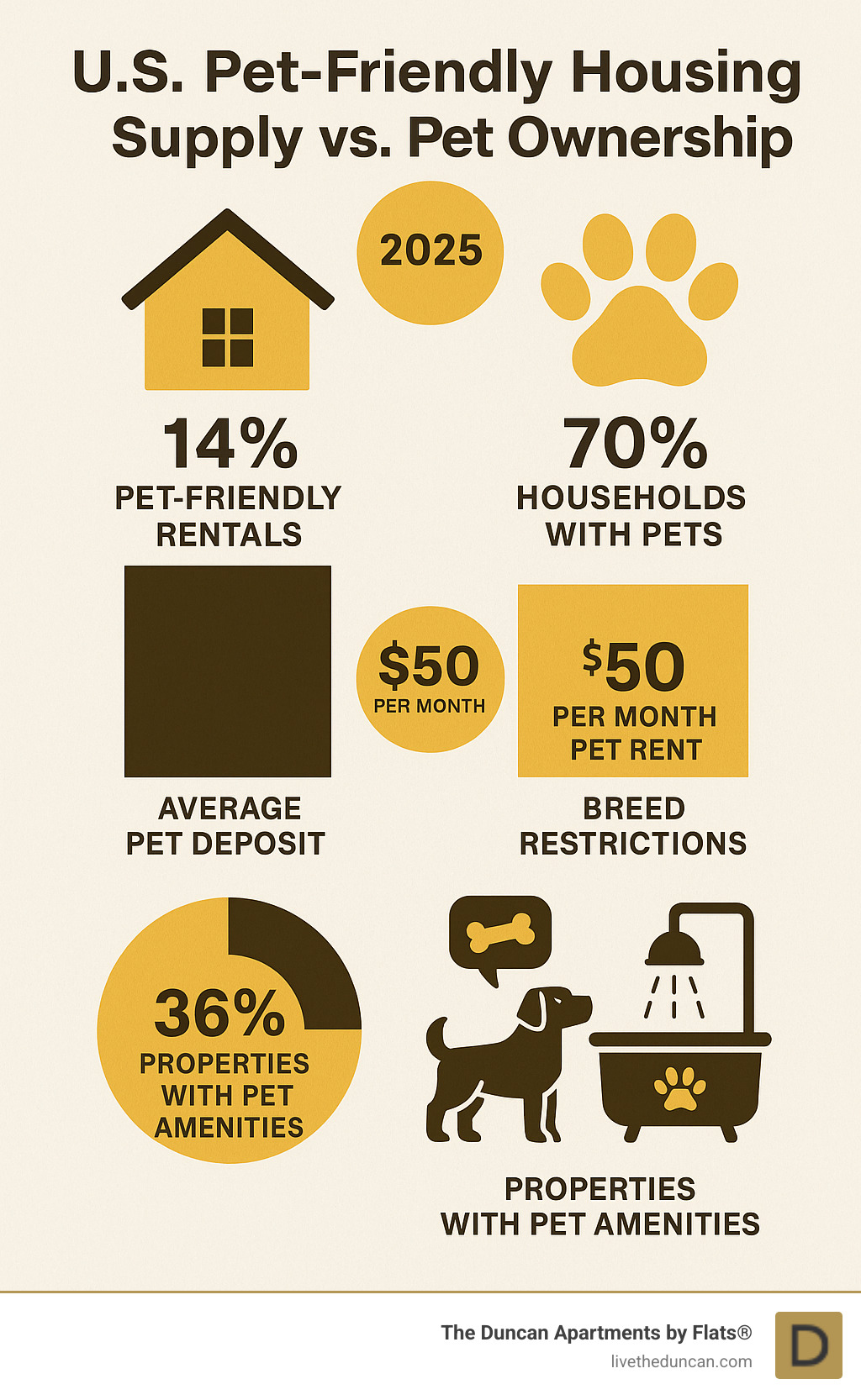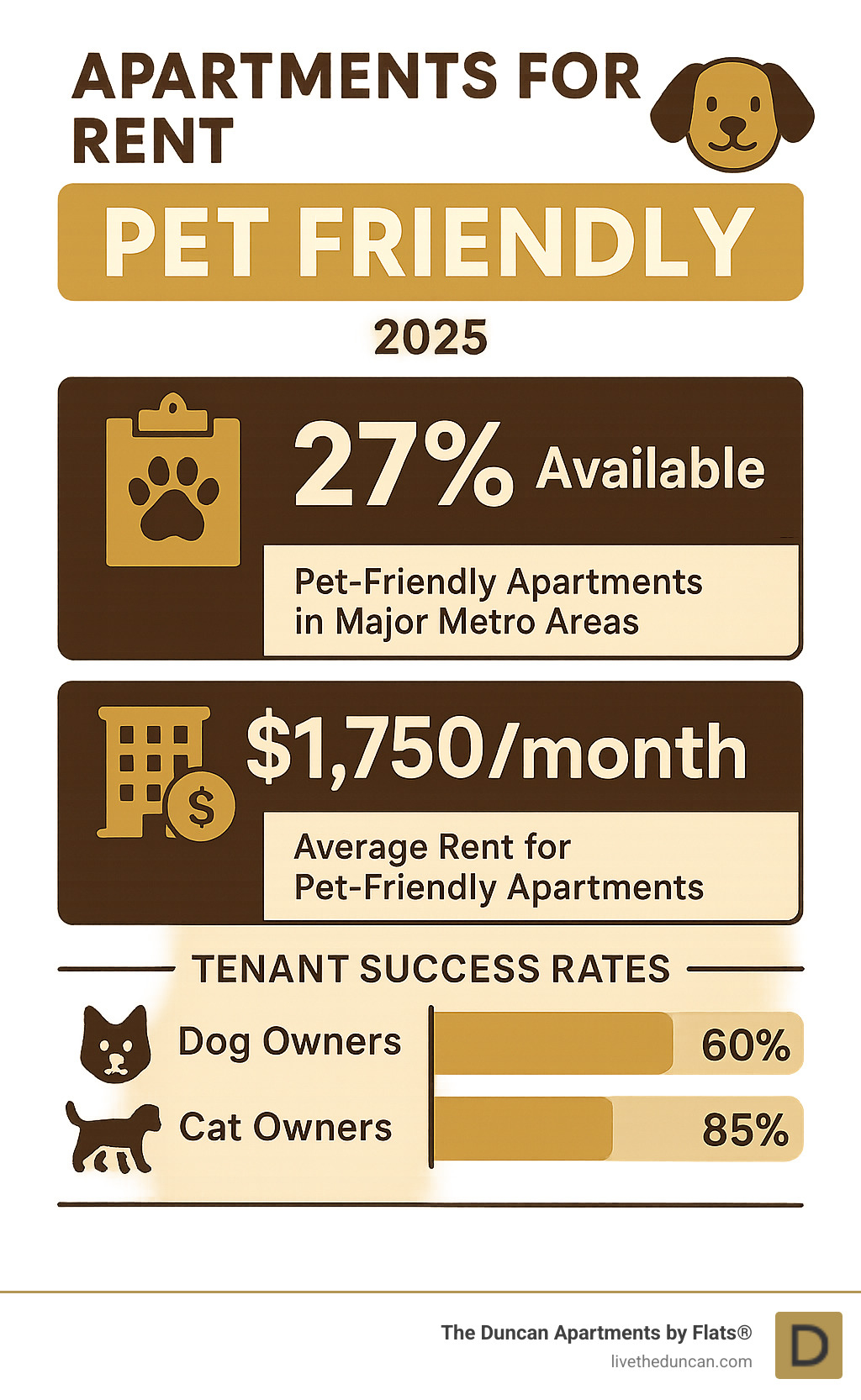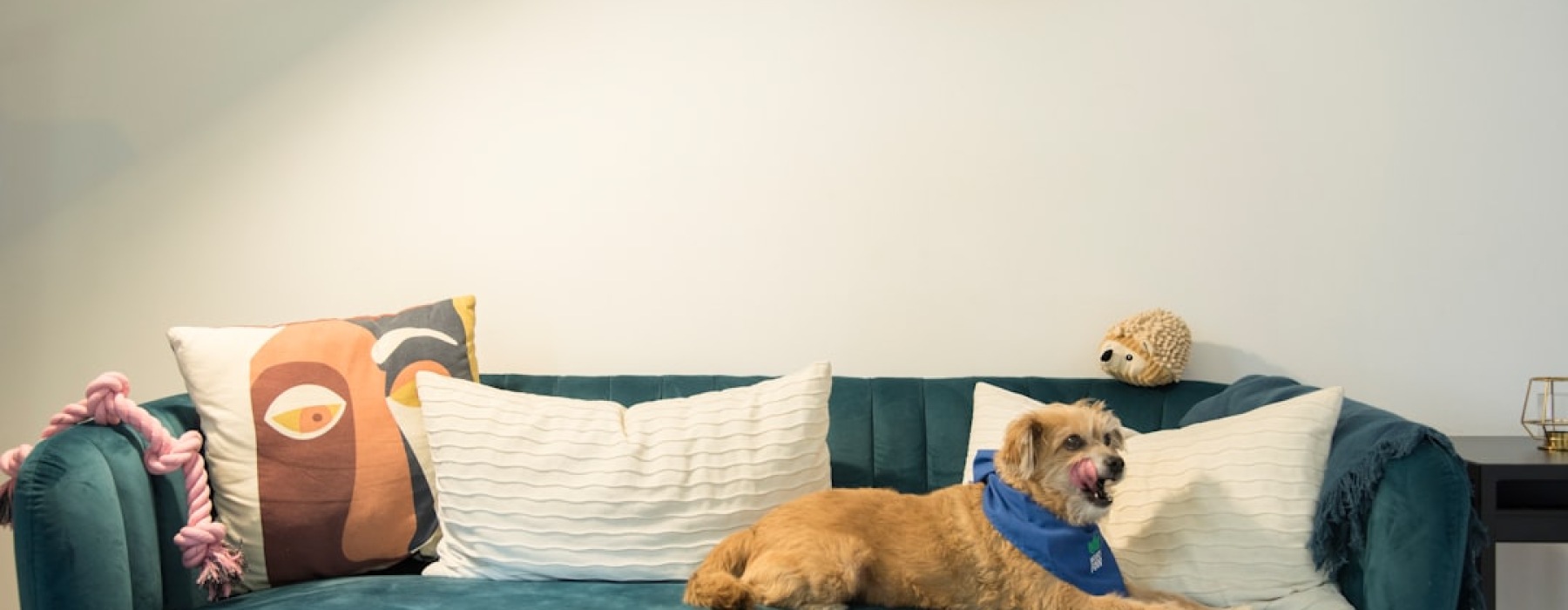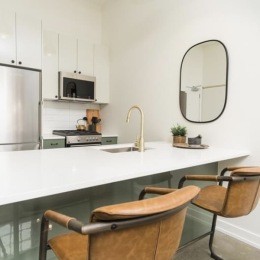No Pets Left Behind: Apartment for Rent Pet Friendly Options
Why Pet-Friendly Apartments Are Essential for Modern Renters
Finding an apartment for rent pet friendly has become a top priority for millions of Americans, with over 220 pet-friendly rental listings available in major cities like Philadelphia alone. Here's what you need to know:
Quick Guide to Pet-Friendly Apartment Hunting:
- Search filters: Use "pet-friendly" on rental sites like Zumper and Apartments.com
- Verify policies: Call properties directly - listings can be outdated
- Expect fees: Pet deposits typically range from $300-$500 per pet
- Monthly rent: Additional $50-$100 per month for pets is common
- Breed restrictions: Many properties still limit certain breeds or sizes
The gap between pet ownership and available housing is real. While 70% of American households own pets, truly pet-friendly rentals remain limited. Many properties that claim to be "pet-friendly" actually have strict breed restrictions, weight limits, or only allow cats.
Modern renters want more than just permission to have pets. They're seeking communities with dog parks, pet washing stations, and nearby walking trails. Properties like The Parker in Chicago now offer 1,100 square-foot outdoor dog patches and complimentary indoor dog showers.
The best pet-friendly apartments understand that pets aren't just animals - they're family members who deserve quality living spaces too.

What Does Pet-Friendly Really Mean? Policies & Restrictions
Here's the truth about apartment for rent pet friendly listings: they don't all mean the same thing. What sounds welcoming in an ad might come with a maze of restrictions that could leave you and your furry friend disappointed.
Most pet-friendly apartments welcome dogs and cats, but the devil is in the details. Your golden retriever might be too big, your pit bull might be banned, or your three cats might be two too many. Fish tanks and small caged birds like parakeets usually get the green light, while hamsters and guinea pigs often need special approval.
Breed restrictions are unfortunately alive and well in rental housing. Many landlords still ban breeds they consider risky - pit bulls, rottweilers, dobermans, and German shepherds top most "no" lists. The good news? The National Dog Inclusive Rental Database helps you find properties that judge pets by behavior, not breed.
Weight limits can be just as frustrating. Your perfectly behaved 60-pound lab mix might be rejected by a property with a 50-pound cap, while that yappy 15-pound terrier next door gets approved. Most apartments set limits between 25 and 80 pounds, though some forward-thinking communities are ditching weight restrictions entirely.
The number of pets you can have typically maxes out at two, though some places allow three with extra fees. Each additional pet usually means more monthly rent and higher deposits, so budget accordingly.
Exotic animals like reptiles, ferrets, or large parrots face the biggest problems. Insurance policies and local laws often prohibit them entirely, even in otherwise pet-friendly buildings.
Now here's where things get important: service animals and emotional support animals have different legal protections. Under Equal Housing rules, legitimate service animals can't be denied housing or charged pet fees, regardless of breed or size restrictions. Emotional support animals have more limited protections and specific documentation requirements.
Watch out for policy change clauses buried in lease agreements. Some landlords reserve the right to modify pet policies with just 30-60 days notice. This could force impossible choices between your pet and your home, so read every word before signing.
What Landlords Mean by "Apartment for Rent Pet Friendly"
Learning to decode landlord language can save you hours of frustration. When a listing says "dog-friendly," it usually means small to medium dogs with breed restrictions. Properties that truly welcome all dogs will specifically advertise "no breed restrictions" or "large dogs welcome."
"Cat-friendly" typically comes with fewer strings attached. Cats are seen as lower risk for noise complaints and property damage, so you'll find more flexibility with multiple cats or fewer restrictions overall.
"Small pets only" is code for everything except dogs - think cats, fish, birds, or small caged animals. Don't bother calling about your border collie.
"Pet considered" means you're applying for approval, not getting automatic acceptance. These landlords evaluate each pet individually, looking at factors like age, training, and temperament rather than blanket policies.
For a comprehensive look at what's available in your area, check out Pet Friendly Apartments for Rent Near Me to see real options with real policies.
The key is asking specific questions upfront. Don't assume "pet-friendly" means your pet will be welcome - get the full policy in writing before you fall in love with a place.
Apartment for Rent Pet Friendly: Finding & Vetting Listings
The hunt for the perfect apartment for rent pet friendly requires strategy, patience, and the right tools. We've finded that casting a wide net while being specific about your pet's needs yields the best results.
Major Rental Platforms offer pet-friendly filters, but use them as starting points rather than definitive sources. Zumper, Apartments.com, and Rent.com all have pet filters, but policies change frequently and listings aren't always updated.
The National Dog Inclusive Rental Database is a game-changer for dog owners facing breed restrictions. This database specifically tracks properties with no breed or weight restrictions, or those accepting dogs over 60-70 pounds. Properties that accept Canine Good Citizen certification are also included. Access it through their Housing Database map for location-specific searches.
Local Facebook groups and community boards often have the most current information. Search for "[Your City] Pet-Friendly Rentals" or "[Your City] Dog Owners" groups. Current residents share real experiences and policy updates that official listings might miss.
Virtual tours and photos can reveal pet-friendly features like:
- Hardwood or tile floors (easier to clean than carpet)
- Ground-floor access or nearby elevators
- Nearby green spaces or walking areas
- Adequate space for pet beds and toys
Direct contact verification is crucial. We recommend calling properties directly to confirm:
- Current pet policy and any recent changes
- Exact fees (deposits, monthly rent, one-time fees)
- Breed and weight restrictions
- Required documentation
- Available move-in dates
Reading lease fine print protects you from surprises. Look for clauses about:
- Policy change notifications
- Pet damage responsibilities
- Noise complaint procedures
- Guest pet policies
- Move-out cleaning requirements
| Search Tool | Best For | Limitations | Pet-Specific Features |
|---|---|---|---|
| Zumper | Major cities, filter accuracy | Limited rural coverage | Breed/size filters, pet photos |
| Apartments.com | National coverage | Outdated policies | Pet amenity listings |
| National Dog Database | Breed-restricted dogs | Dogs only, user-submitted | No breed restrictions focus |
| Facebook Groups | Local insights, current info | Time-intensive searching | Real resident experiences |
| Craigslist | Budget options, private landlords | Scam risk, limited filters | Direct landlord communication |
For more local options, explore Animal Friendly Apartments Near Me to find communities that truly welcome pets.
Nailing the Application: Deposits, Docs & Landlord Concerns
Getting approved for your ideal apartment for rent pet friendly goes beyond just finding the perfect listing. You need to show landlords that both you and your furry friend will be outstanding tenants. The difference between approval and rejection often comes down to how well you prepare your application materials.
Building a compelling pet resume transforms your application from ordinary to memorable. Think of it as your pet's professional portfolio. Include your pet's basic information like name, age, breed, and weight, along with current vaccination records and health certificates from your veterinarian.
Spay or neuter documentation shows responsible pet ownership, while training certifications demonstrate your commitment to good behavior. Canine Good Citizen certification can be particularly powerful - this American Kennel Club program proves your dog has mastered basic obedience and social skills. Some properties specifically welcome dogs with CGC certification, even when they normally have breed restrictions.
Professional photos make a huge difference too. Skip the blurry phone shots and include clear images that show your pet's calm, well-groomed appearance. Add references from previous landlords who can speak specifically about your pet's behavior, plus your veterinarian's contact information for verification.
The documentation checklist covers what most landlords require upfront. Current vaccination records are non-negotiable - that means rabies, DHPP for dogs, and FVRCP for cats. Health certificates from licensed veterinarians prove your pet is in good condition, while training certificates or behavioral assessments show you've invested in proper socialization.
Don't forget about renter's insurance that includes pet liability coverage. This typically adds just a small monthly cost but provides significant protection for both you and your landlord against potential pet-related incidents.
Pet interviews are becoming more common, especially in competitive rental markets. When you meet with the landlord, bring your pet at their absolute best. Demonstrate basic commands like sit, stay, and come. Show how your pet interacts calmly with strangers and be ready to discuss your daily exercise routine and care schedule.
Address any concerns the landlord raises directly and honestly. If your dog is a breed that faces restrictions, come prepared with information about your pet's individual temperament and training history.
Understanding the financial side helps you budget and negotiate effectively. Pet deposits are typically refundable if you leave the unit in good condition - they're meant to cover potential damage beyond normal wear and tear. Non-refundable pet fees are one-time charges you won't get back regardless of how well-behaved your pet is. Monthly pet rent is an ongoing addition to your lease that covers increased maintenance and insurance costs.
Smart negotiation tactics can save you money while showing your commitment. Consider offering a higher pet deposit in exchange for waived monthly pet rent, or suggest paying for professional carpet cleaning at move-out. Providing additional references from previous landlords or offering to sign a pet addendum with specific behavioral agreements shows you're serious about being a responsible tenant.
The strongest applications include professional pet photos that showcase calm, well-groomed animals, training certificates from reputable schools, and veterinary references confirming good health and regular care. Previous landlord testimonials specifically about your pet carry significant weight, as does having pet liability insurance through your renter's policy.
Behavioral contracts outlining your pet care commitments, emergency contact information for pet care during travel, and breed-specific education materials if you have a restricted breed all demonstrate your thoroughness and responsibility.
Our Amenities page shows how we support pet-owning residents with dedicated facilities designed to make apartment living work beautifully for both pets and their families.
Proving Your Pet Belongs in an Apartment for Rent Pet Friendly
Landlords have three main concerns about pets: property damage, noise complaints, and liability issues. The key to approval is addressing these worries before they're even raised.
Showcasing clean habits starts with demonstrating your pet's house training. For cats, provide litter box training certificates or documentation from your veterinarian. For dogs, discuss your house-training success and daily routine. Talk about your cleaning schedule and mention that you use pet-safe cleaning products exclusively.
Noise control strategies show you understand apartment living challenges. Explain your pet's daily exercise schedule and how you handle barking, meowing, or other vocalizations. If you use anti-anxiety tools like calming collars, white noise machines, or specific training techniques, mention these proactively. Neighbor references from previous apartments can be incredibly powerful here.
Renter's insurance add-ons for pet liability provide peace of mind for landlords while protecting you financially. These additions typically provide substantial coverage for pet-related incidents at a reasonable monthly cost. This protection benefits both you and your landlord, showing you've thought through potential scenarios and taken responsibility for them.
The goal is to present yourself and your pet as the kind of tenants any landlord would be thrilled to have - responsible, prepared, and committed to maintaining a great living environment for everyone in the building.
Living the Good Life: Amenities, Costs & Tenant Duties
Moving into your new apartment for rent pet friendly marks the beginning of an exciting chapter for you and your furry companion. The best pet-friendly communities understand that great amenities make all the difference in creating a comfortable home for both human and animal residents.
Modern pet-friendly properties have evolved far beyond simply allowing pets. Today's communities feature dedicated dog parks and runs where your pup can socialize and burn energy safely off-leash. These fenced areas often include agility equipment, separate sections for small and large dogs, and convenient waste stations. Some properties even offer pet washing stations with professional-grade tubs, non-slip surfaces, and complimentary shampoos - saving your bathroom from muddy paw prints after rainy walks.
Walking trails and green spaces transform daily exercise from a chore into a pleasure. Look for communities with well-lit paths, plenty of waste bag dispensers, and landscaping that encourages exploration. Properties near parks or with extensive grounds make those early morning and late evening walks much more enjoyable.
The most thoughtful communities go even further, offering pet-sitting services or maintaining partnerships with local dog walkers for busy residents. Some properties keep lists of nearby emergency veterinarians, 24-hour animal hospitals, and trusted boarding facilities - invaluable resources when you need them most.
Living in a pet-friendly community does come with ongoing financial considerations beyond your initial deposits. Renter's insurance with pet liability coverage typically adds a small monthly cost but provides significant protection for pet-related incidents. Budget for additional cleaning supplies since pet ownership naturally means more frequent cleaning. Setting aside funds for potential repairs and professional move-out cleaning helps avoid surprises when it's time to relocate.
Your daily routine as a pet-owning tenant centers around maintaining a consistent cleaning schedule. This means daily vacuuming or sweeping if you have shedding pets, immediate cleanup of any accidents with enzyme-based cleaners, and regular surface wiping where pets spend time. For cat owners, daily litter box maintenance prevents odors that could strain neighbor relationships.
Noise consideration plays a crucial role in community harmony. Ensuring your dog gets adequate exercise prevents excessive barking from pent-up energy. During storms or fireworks, white noise machines can help calm anxious pets. Address any vocal behaviors quickly - your neighbors will appreciate your attentiveness to their comfort.
Damage prevention protects both your security deposit and your relationship with property management. Regular nail trims prevent scratching damage, while furniture protectors and pet-safe fabrics reduce wear. Providing adequate scratching posts for cats and using pet gates to limit access to certain areas can prevent costly repairs.
Sometimes landlords need to update pet policies mid-lease due to insurance changes or new management requirements. When this happens, review your lease carefully for policy change notification requirements and document all communications. Local tenant rights organizations can provide guidance if changes seem unreasonable or violate your lease terms.
The emergence of communities specifically welcoming large dogs reflects growing demand from pet owners. These properties feature reinforced flooring, larger unit sizes, and improved outdoor areas designed for bigger, more active dogs. They often implement specialized cleaning protocols and maintenance procedures suited to larger pets.
For Chicago residents seeking truly dog-friendly options, Dog Friendly Apartments Chicago IL provides comprehensive local resources for finding communities that welcome pets of all sizes.
Equal Housing rules provide important protections for residents with service animals or properly documented emotional support animals. These protections ensure that legitimate assistance animals cannot be denied housing or charged additional fees based on breed restrictions or other pet policies.
Frequently Asked Questions about Pet-Friendly Apartments
Do all "apartment for rent pet friendly" listings allow big dogs?
Here's the reality that might surprise you: most pet-friendly listings actually don't welcome large dogs. While a property might advertise as pet-friendly, they often have weight limits that cap dogs at 25-50 pounds. Only about one in five truly pet-friendly properties will accept dogs over 60 pounds without batting an eye.
If you're sharing your life with a gentle giant, you'll need to dig deeper than surface-level listings. Look for properties that specifically mention "large dogs welcome" or "no weight restrictions" in their descriptions. The National Dog Inclusive Rental Database becomes your best friend here - it's specifically designed to track properties that accept dogs over 60-70 pounds.
Sometimes persistence pays off. We've seen large-dog families successfully negotiate with properties that normally have restrictions by providing Canine Good Citizen certification or comprehensive behavioral assessments. A well-documented, well-trained large dog can sometimes open doors that initially seemed closed.
What happens if the landlord changes the pet policy mid-lease?
This scenario happens more often than anyone wants to admit, usually when properties switch management companies or face new insurance requirements. The good news? You're not completely powerless.
Your lease agreement holds the key to understanding your rights. Most leases include clauses allowing policy changes with 30-60 days written notice, but many states have tenant protection laws that prevent landlords from making changes that would force you to choose between your pet and your home.
If your landlord tries to change pet policies mid-lease, start by reviewing your lease language carefully. Document every conversation and email exchange - you'll want this paper trail if things escalate. Local tenant rights organizations can provide guidance specific to your area's laws.
Many landlords would rather work with good tenants than deal with turnover costs. Consider proposing compromises like additional pet deposits or signing behavioral agreements for your current pets. Sometimes a reasonable conversation can solve what initially feels like an impossible situation.
Are service animals or ESAs ever subject to pet fees or breed bans?
Service animals enjoy the strongest legal protections and should never face pet fees, deposits, or breed restrictions. The Americans with Disabilities Act and Fair Housing Act create clear boundaries here - legitimate service animals that perform specific tasks for people with disabilities are protected, period.
Emotional Support Animals (ESAs) operate under different rules through the Fair Housing Act. While properly documented ESAs cannot be charged pet fees or deposits, they require prescription from licensed mental health professionals. Landlords can request appropriate documentation, but they cannot impose the same restrictions they might place on regular pets.
Unfortunately, confusion around these laws means some landlords incorrectly try to charge fees or impose restrictions on ESAs. If you encounter pushback, provide proper documentation from licensed professionals and reference Fair Housing Act protections. HUD and local fair housing organizations can provide support if landlords refuse reasonable accommodations.
Both service animals and ESAs can be held accountable for damage, safety threats, or significant disturbances, but the standards are much higher than for regular pets. The key is having proper documentation and understanding your rights under federal housing law.

Conclusion
Finding the perfect apartment for rent pet friendly doesn't have to mean compromising on quality or settling for less than your family deserves. With the right research approach, thorough preparation, and realistic expectations about costs and policies, you and your pets can find a community that genuinely welcomes every member of your household.
The rental landscape is gradually shifting to better accommodate pet owners. More properties are removing outdated breed restrictions, adding thoughtful pet amenities, and recognizing that responsible pet owners often make the most reliable, long-term tenants. While challenges persist—particularly for families with large dogs or multiple pets—resources like the National Dog Inclusive Rental Database and targeted community searches are making the hunt significantly easier.
The least expensive option rarely provides the best long-term value. Properties with dedicated pet amenities, reasonable policies, and management teams who understand pets often deliver far better experiences, even when upfront costs run higher. The peace of mind that comes from knowing your pet is truly welcome makes those extra fees worthwhile.
At The Duncan Apartments by Flats®, we recognize that pets aren't just animals—they're beloved family members who deserve comfortable, welcoming living spaces. Our West Loop residences feature spacious floor plans where pets can truly thrive, combined with convenient access to Chicago's finest parks and walking areas.
From our rooftop lounge where well-behaved pets can take in stunning city views to our prime location near pet-friendly businesses and essential services, we've thoughtfully designed our community with pet-owning residents in mind. The nearby parks provide perfect spaces for daily exercise, while our modern amenities ensure both you and your pets enjoy comfortable city living.
Whether you're relocating to Chicago for the first time or moving within the city limits, we'd love to show you how our resident-approved amenities improve life for both you and your pets. Find more about our pet-friendly features and community benefits at Live The Duncan Amenities.
Your pets deserve more than just tolerance—they deserve a true home where they're genuinely welcomed and appreciated. With patience, preparation, and the right approach, you'll find that ideal apartment for rent pet friendly where your entire family can flourish and create lasting memories together.









